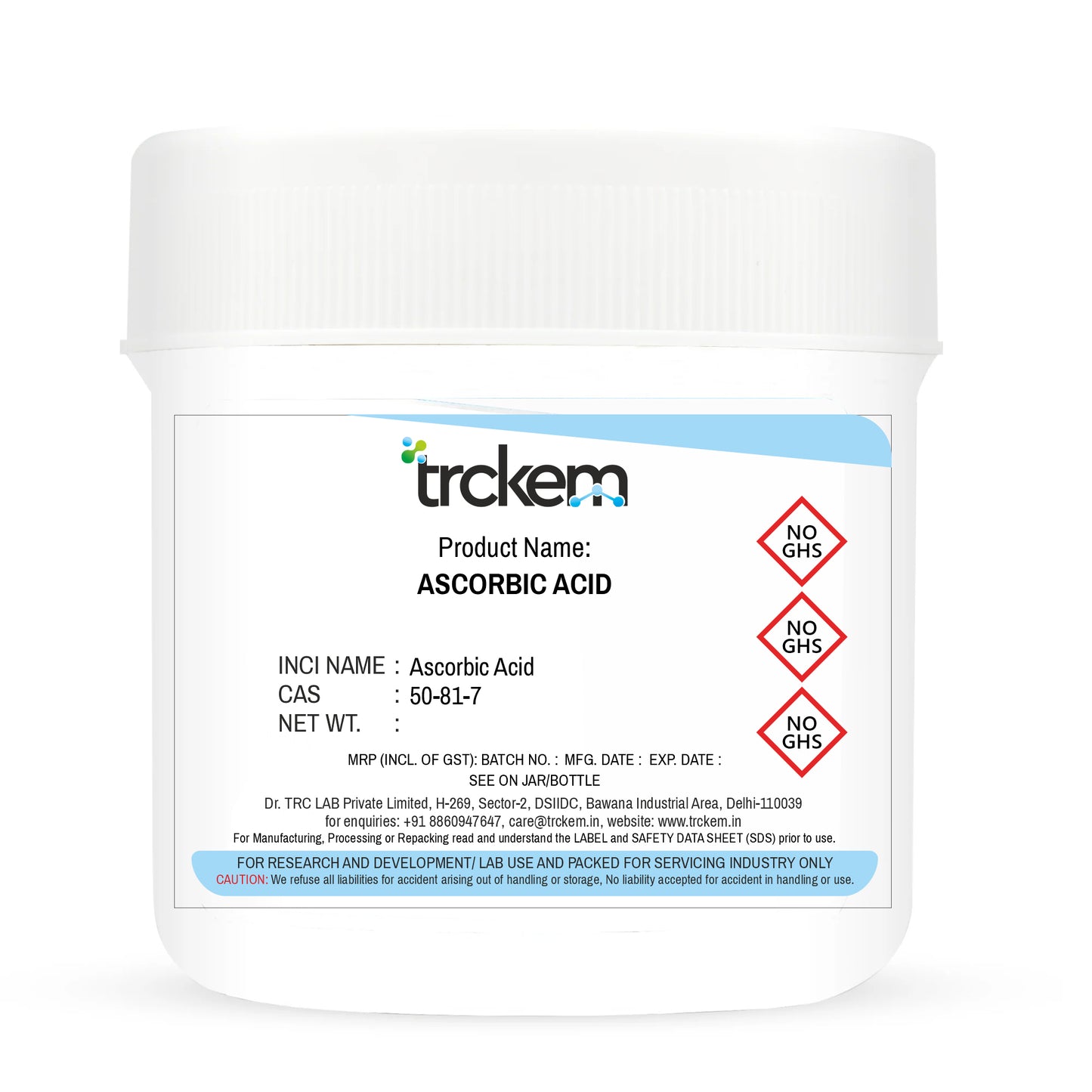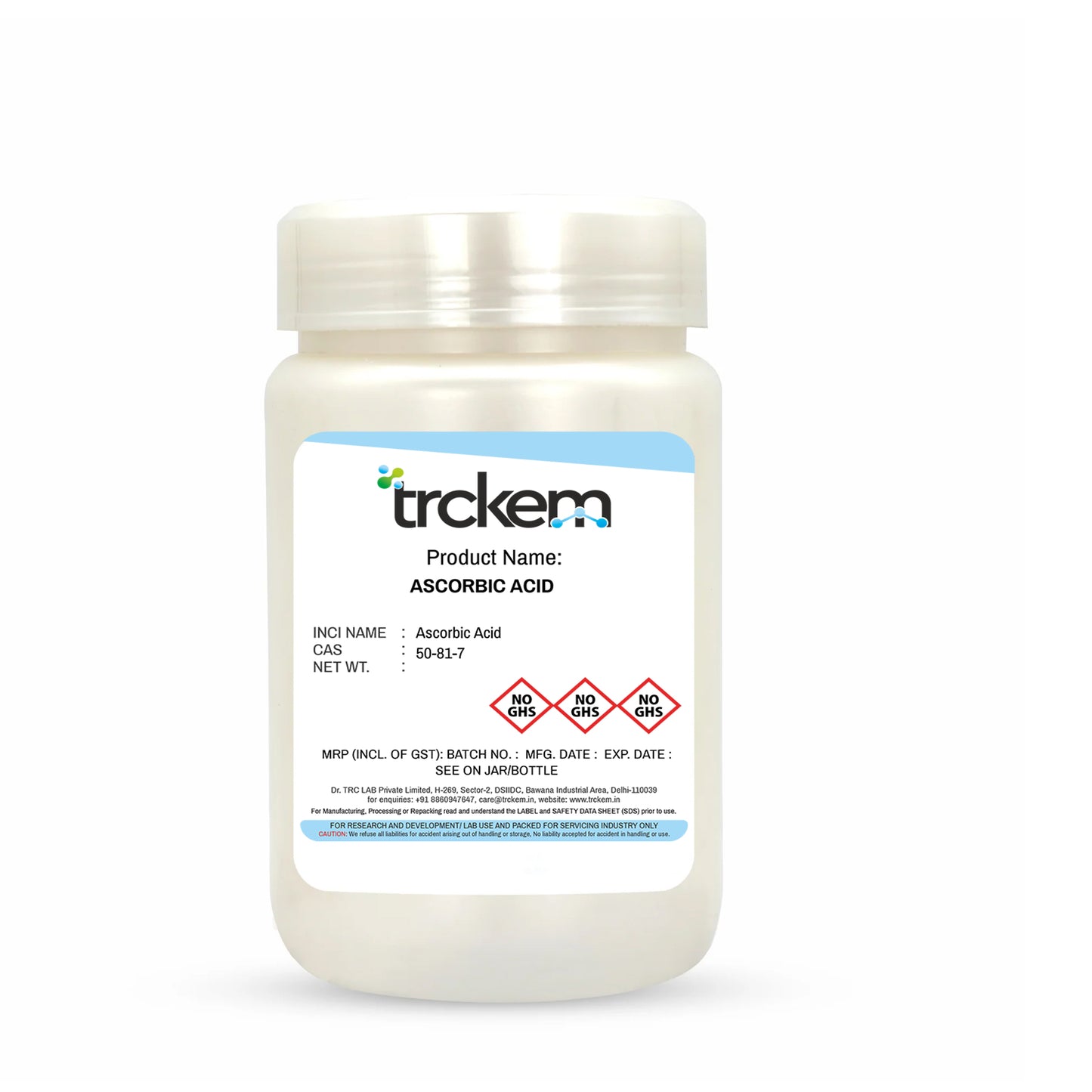

General Description
Ascorbic Acid, commonly known as Vitamin C, is a powerful antioxidant widely used in skincare and cosmetic formulations. It is known for its skin-brightening, anti-aging, and collagen-boosting properties, making it a highly desirable ingredient for beauty brands. Ascorbic Acid is available in various forms, including powders, serums, and creams, offering flexibility for manufacturers looking to develop high-performance skincare products.
Uses in the Cosmetics Industry
Ascorbic Acid is a key ingredient in many skincare formulations due to its multiple benefits:
- Skin Brightening: Helps reduce dark spots, hyperpigmentation, and uneven skin tone, making it a popular choice in serums and face creams.
- Anti-Aging: Boosts collagen production, reducing fine lines and wrinkles for firmer, youthful-looking skin.
- Antioxidant Protection: Shields skin from environmental damage caused by UV rays and pollution.
- Acne Treatment: Helps in reducing inflammation and promoting a clearer complexion.
If you are looking to buy Ascorbic Acid wholesale, we supply high-quality, pure Ascorbic Acid ideal for cosmetic manufacturing and beauty product formulation.
Side Effects & Hazards
While Ascorbic Acid is generally safe, improper use can lead to:
- Skin Irritation: High concentrations may cause redness, dryness, or a tingling sensation, especially for sensitive skin types.
- Oxidation: Ascorbic Acid is highly unstable and can degrade when exposed to air and light, reducing its effectiveness. Proper formulation and storage are crucial.
- Allergic Reactions: Though rare, some individuals may experience itching or rash upon topical application.
To ensure optimal results, it’s essential to buy stabilized Ascorbic Acid from a trusted supplier for manufacturing effective cosmetic products.
Buy Wholesale Ascorbic Acid for Your Skincare Brand
Looking for Ascorbic Acid for sale? We provide premium wholesale Ascorbic Acid for skincare manufacturers and cosmetic formulators. Whether you need bulk supply for serums, creams, or masks, our high-purity Vitamin C ensures maximum potency. Contact us today for competitive pricing and bulk orders.
CAS NO. :-50-81-7
INCI:-Ascorbic Acid
COMPOSITION:-Ascorbic acid, also known as Vitamin C, is a water-soluble antioxidant composed of carbon, hydrogen, and oxygen with the molecular formula C6H8O6.
PURITY GRADE:- Typically ≥ 99% for pharmaceutical, cosmetic, or food grade.
APPEARANCE:- White to slightly yellow crystalline powder or colorless crystals.
SOLUBILITY:-Soluble in water (33 g/L at 25°C).
Slightly soluble in alcohol and insoluble in oils.
PRESEVATION:- Pure ascorbic acid does not require preservatives.
In formulations, additional stabilizers like ferulic acid or pH adjusters may be used to extend its shelf life.
STORAGE:-Store in a cool, dry place, away from light and moisture.
Use airtight, opaque containers to prevent oxidation and degradation.
RAW MATERIAL SOURCE:- Typically synthesized from glucose, which is derived from natural sources like corn or tapioca.
MANUFACTURE:-Ascorbic acid is commonly produced through the Reichstein process or modern fermentation methods, where glucose undergoes oxidation and other chemical reactions to form ascorbic acid.
ANIMAL TESTING:- Ascorbic acid itself is not generally tested on animals.
Verify with suppliers for cruelty-free certification.
GMO:-Non-GMO as long as the glucose used in its synthesis is derived from non-GMO sources.
Always confirm with specific suppliers for certification.
VEGAN:-Yes, ascorbic acid is vegan as it is synthetically produced or derived from plant-based glucose
PROPOSITION:-Widely used in cosmetics for its skin-brightening, antioxidant, and anti-aging properties.
Found in serums, creams, and sunscreens to protect against oxidative stress and improve skin tone.
In food and beverages, it acts as a preservative and nutritional supplement (Vitamin C).
WARNING:-Ascorbic acid is generally safe for topical and internal use.
Can cause skin irritation or sensitivity in high concentrations or individuals with sensitive skin.
Susceptible to oxidation, leading to reduced efficacy in formulations. Stabilize and store properly to maintain effectiveness.
THE STORY OF ASCORBIC ACID

Ascorbic Acid: The Gold-Standard Antioxidant for Skin Brightening
Ascorbic Acid, a pure form of Vitamin C, is one of the most researched and results-driven actives in skincare. Known for its brightening, anti-aging, and antioxidant benefits, it helps fade dark spots, boost collagen, and protect skin from environmental stress. A hero ingredient in serums, creams, and dermo-cosmetic treatments.

Bio-Fermented, Purified & Stabilized for Cosmetic Use
Cosmetic-grade Ascorbic Acid is produced through controlled fermentation of glucose, followed by purification and crystallization. TRCkem supplies high-assay (≥99.5%) micro-fine powder designed for maximum skin penetration when freshly activated in water-based or anhydrous formulations.

Brighten. Protect. Rebuild.
Ascorbic Acid delivers multiple clinically proven skin benefits:
✅ Fades pigmentation & dark spots
✅ Boosts collagen for firmer skin
✅ Neutralizes free radicals & UV-induced damage
✅ Enhances SPF performance when paired with sunscreen
✅ Improves skin radiance & smoothness
Ideal for serums, boosters, powder-in-capsule actives, and brightening treatments.

Potent, But pH-Sensitive – Formulate with Care
Recommended usage level: 5–20% in leave-on skincare.
Best stability at pH 3.0–3.5 (water-based), or anhydrous systems.
Highly oxidation-sensitive — protect from light, heat, and air.
Store in airtight packaging under cool, dry conditions.
Globally approved for topical cosmetic use (EU, US, Asia).
May cause mild tingling on very sensitive skin at high percentages.
Formulator’s Queries, We Answered
1. What is Ascorbic Acid?
Ascorbic Acid, commonly known as Vitamin C, is a powerful antioxidant used in skincare to brighten skin, reduce pigmentation, and protect against environmental damage. It is widely used in personal care products for its anti-aging and skin-rejuvenating benefits.
2. What is the CAS number and INCI name of Ascorbic Acid?
CAS Number: 50-81-7
INCI Name: Ascorbic Acid
3. What are the benefits of Ascorbic Acid in skincare?
Ascorbic Acid is known for:
Skin brightening: Reduces dark spots and evens out skin tone.
Antioxidant protection: Neutralizes free radicals and protects against pollution and UV damage.
Collagen synthesis: Stimulates collagen production, improving skin elasticity and reducing wrinkles.
Anti-inflammatory effects: Helps calm redness and irritation.
4. How does Ascorbic Acid work on the skin?
Ascorbic Acid inhibits melanin production by blocking the enzyme tyrosinase, leading to a brighter complexion. It also stimulates collagen synthesis, making the skin firmer and reducing fine lines.
5. Is Ascorbic Acid suitable for all skin types?
Yes, but sensitive skin types may experience mild irritation. It is recommended to start with a lower concentration (5-10%) and gradually increase usage.
6. What types of personal care products contain Ascorbic Acid?
Ascorbic Acid is found in:
Serums
Moisturizers
Face masks
Eye creams
Sunscreens
7. Can Ascorbic Acid be used with other skincare ingredients?
Yes, Ascorbic Acid works well with:
Ferulic Acid & Vitamin E (boosts stability and efficacy)
Hyaluronic Acid (for hydration)
Sunscreen (to protect against UV damage)
🚫 Avoid using Ascorbic Acid with Niacinamide and Retinol in the same routine, as they may reduce its effectiveness or cause irritation.
8. Does Ascorbic Acid cause any side effects?
Ascorbic Acid may cause:
Mild irritation or tingling, especially for sensitive skin.
Oxidation issues, making the product turn yellow/brown over time.
Sun sensitivity, so always use sunscreen after application.
9. What is the recommended concentration of Ascorbic Acid in skincare?
5-10%: Suitable for beginners and sensitive skin.
15-20%: Most effective range for brightening and anti-aging.
10. How is Ascorbic Acid different from its derivatives (e.g., Sodium Ascorbyl Phosphate, Magnesium Ascorbyl Phosphate)?
Ascorbic Acid: The most potent but unstable form.
Sodium Ascorbyl Phosphate & Magnesium Ascorbyl Phosphate: More stable but less effective in direct skin penetration.
11. Where can I purchase high-quality Ascorbic Acid for formulation purposes?
Ascorbic Acid is available from reputable cosmetic raw material suppliers. Look for stabilized or encapsulated forms to enhance shelf life and effectiveness.



